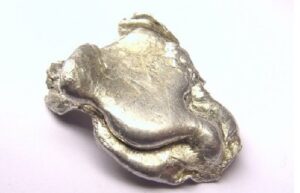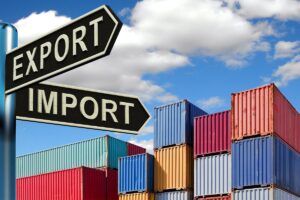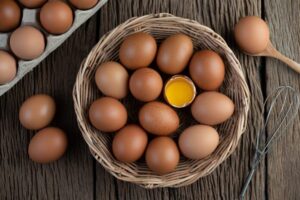
Ukraine has the potential to expand bilateral agricultural trade with the US, particularly in the export of meat, eggs, corn, and queen bees, according to the State Service for Food Safety and Consumer Protection following a working visit to the US by the agency’s head, Serhiy Tkachuk.
The State Service noted that during the visit, Tkachuk held meetings with representatives of three departments of the US Department of Agriculture.
Together with the USDA Foreign Agricultural Service (FAS), the parties discussed increasing bilateral trade in agricultural products. Ukraine has the potential to replace Russian and Chinese products on the American market, the agency assured. Particular attention was paid to opening the US market for Ukrainian poultry and eggs.
Negotiations with the USDA Food Safety Inspection Service (FSIS) focused on access to the US market for Ukrainian poultry meat and eggs. The State Service of Ukraine for Food Safety and Consumer Protection has already provided all the necessary information and expressed its readiness to undergo inspections, including online. This practice has been successfully applied in cooperation with the United Kingdom, Canada, and the EU.
The Ukrainian side emphasized the importance of moving forward with applications for the export of pork and beef, and the FSIS confirmed its readiness to begin technical consultations.
The meeting with the USDA Animal and Plant Health Inspection Service (APHIS) was devoted to the epizootic situation, the procedure for assessing the status of diseases, and inspections.
In addition, the meetings discussed the prospects for exporting Ukrainian corn and queen bees. The American side positively assessed the dynamics regarding corn and promised to consider the issue of bees in the near future.
“These dialogues confirm that even in times of war, the Ukrainian agricultural sector remains a reliable and promising partner. We feel the support of our American colleagues and their willingness to move forward in opening up new opportunities for Ukraine,” concluded the head of the State Food and Consumer Service.

In January-August of this year, Ukraine reduced manganese ore exports by 82.2% compared to the same period last year, to 8,014 thousand tons, but in August, it stepped up deliveries.
According to statistics released by the State Customs Service (SCS), while deliveries in the first seven months of 2025 amounted to 2,977 thousand tons, exports more than doubled in August, when 5,037 thousand tons were exported.
In monetary terms, exports for the first eight months of 2025 fell by 79.8% compared to the same period in 2024, to $1.329 million.
The main exports were to Slovakia (97.89% of shipments in monetary terms) and Poland (2.11%).
There were no imports of manganese ore during this period.
As reported, in January 2024, Ukraine exported 44,903 thousand tons of manganese ore worth $6.563 million to the US, breaking a two-year absence of supplies to foreign markets. In February-December 2024, there were no exports of manganese ore.
At the same time, for the whole of 2024, the country imported 84,293 thousand tons worth $18.302 million from Ghana (98.85%), Brazil (0.99%), and Belgium (0.11%). There were no imports in October-November.
Ukraine did not export manganese ore in 2022 and 2023, and in 2021 it exported 770 tons worth $89 thousand.
In addition, it was reported that the Pokrovsky Mining and Processing Plant (PGZK, formerly Ordzhonikidze Mining and Processing Plant) and the Marganetsky Mining and Processing Plant (MGZK, both in Dnipropetrovsk region), which are part of the Privat Group, stopped mining and processing raw manganese ore in late October-early November 2023, while NZF and ZZF stopped smelting ferroalloys. In the summer of 2024, ferroalloy plants resumed production at a minimum level.
PGZK and MGZK did not produce any products in 2024, while in 2023, PGZK produced 160.31 thousand tons of manganese concentrate, and MGZK was idle.
In Ukraine, manganese ore is mined and enriched by the Pokrovsky and Marganets mining and enrichment plants.
The consumers of manganese ore are ferroalloy enterprises.

In the first eight months of 2025, Ukraine increased imports of tin and tin products by 42.9% to $2.632 million (in August – $294,000).
Exports fell almost threefold to $104,000 compared to $344,000 last year (in August – $3,000).
Tin is mainly used as a safe, non-toxic, corrosion-resistant coating in its pure form or in alloys with other metals. The main industrial applications of tin are in white tin (tinned iron) for the manufacture of food containers, in solders for electronics, in domestic piping, in bearing alloys, and in coatings of tin and its alloys. The most important tin alloy is bronze (with copper).

Ukraine exported 580,000 tons of sugar during the 2024-2025 marketing year (August-September), which is 32% of the country’s production, which is 16% less than in the previous marketing year, when 692,000 tons were supplied to foreign markets, according to the National Association of Sugar Producers of Ukraine “Ukrtsukor.”
The industry association noted that of the total exports in 2024/2025, 17% went to EU countries and 83% to the global market. Last season, the ratio was 77% to the EU and 23% to the global market.
The main importers of Ukrainian sugar in 2024/2025 MY were the EU (17%), Turkey (14%), Libya (10%), North Macedonia (8%), Lebanon (5%), and Somalia (5%). Among the EU countries, the main buyer of Ukrainian sugar was Bulgaria, which accounted for 59% of the total volume.
Ukrtsukor noted that Ukraine has already begun harvesting sugar beets for processing in the 2025/2026 season. The estimated area to be harvested is 198,000 hectares. Sugar production is forecast at 1.5 million tons.

Imports of goods from Ukraine in January-August 2025 amounted to $52.6 billion in monetary terms, which is 16.63% more than in the same period of 2024, but exports decreased by 4.36% to $26.3 billion, according to the State Customs Service (SCS).
“At the same time, taxable imports amounted to $37.8 billion, which is 84% of the total volume of imported goods. The tax burden per 1 kg of taxed imports in January-August 2024 amounted to $0.5/kg, which is 7% more than in the same period of 2023,” the service said in a publication on its Telegram channel on Thursday.
As before, the largest imports to Ukraine came from China ($8.9 billion), Poland ($4.5 billion), and Germany ($3.4 billion).
The largest exports from Ukraine went to Poland ($3.1 billion), Spain ($1.9 billion), and China ($1.9 billion).
Of the total volume of goods imported in January-August 2024, 65% were machinery, equipment, and transport—$15.5 billion (during customs clearance of these goods, UAH 111.4 billion, or 31% of customs payments, was paid to the budget), chemical industry products – $7.8 billion (57.9 billion hryvnia paid to the budget, or 16% of customs payments), fuel and energy products – $6 billion (97.9 billion hryvnia paid to the budget, or 26% of customs payments).
The top three most exported goods from Ukraine were food products ($16 billion), metals and metal products ($2.9 billion), and mineral products ($2.2 billion).
“In the first eight months of 2024, UAH 189.3 million was paid to the budget during customs clearance of exports of goods subject to export duties,” the SSU added.

Ukrainian producers exported chicken eggs worth $103.1 million in January-July 2025, which is 2.6 times more than in the same period last year, according to the Ukrainian Poultry Farmers Union, citing data from the State Customs Service.
The industry association specified that in July this year, 190.6 million eggs worth $17 million were exported, which exceeded the figure a year ago by 86%.
The top three importers of Ukrainian chicken eggs in July 2025 were Spain (21.5 million eggs), the United Kingdom (21.4 million eggs), and Poland (22.7 million eggs).
According to the Ukrainian Poultry Farmers Union, the main buyers of Ukrainian eggs in January-July were Croatia (11.8%), the United Kingdom (10.6%), and Spain (9.5%).